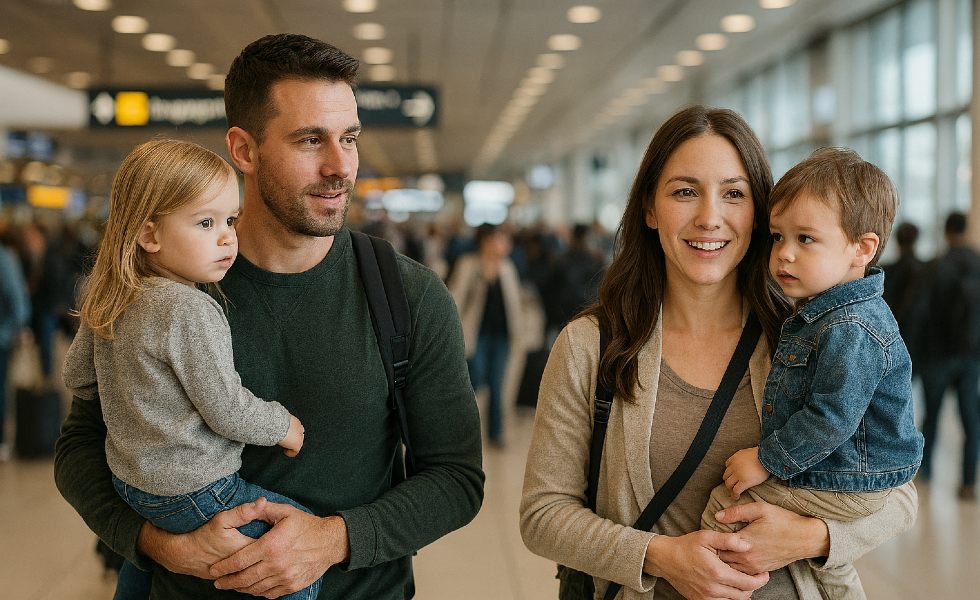Travel with children whether by necessity, or for leisure can be supported by our travel clinic.
- With careful pre-travel preparation most families can enjoy a fun and exciting trip.
- Advice from a travel health professional should be sought 4-6 weeks prior to travel (although last-minute advice is still useful if time is short).
- Families should research the destination and health facilities as well as ensure they have comprehensive travel insurance to cover planned activities and medical conditions.
- Infants and children are at risk of deteriorating quickly if they become ill while travelling; infants and young children are more likely to develop severe malaria.
- Safety standards may not be the same around the world; accidents and drowning are the most common causes of injury or death in children while travelling.
- A pre-travel consultation offers an opportunity to ensure routine vaccinations are up to date as well as to offer age-appropriate vaccinations and antimalarial medication for travel.
- more info on travelling safely with children can be found at: NaTHNaC – Children
A friendly approach
Our experienced staff have been preparing children for travel and vaccinating for many years. They will assist you in making decisions based on your particular destination and risks. They will be happy for children to be distracted by an activity, additional adult or their favourite cartoon whilst they carry out the risk assessment with the parent.
How you can help
Safe holding is one of the key aspects of a safe injection. Holding is beneficial in making children feel safe, secure and comforted and it assists with the safe delivery of vaccines by preventing movement of arms and legs during injections. A comforting hold avoids the feeling of being overpowered, encourages nurturing by the parent and provides a steady injection site.
Taking some time to review safe holding for a child – arms should remain secure to avoid grabbing injuries.
They can be vaccinated in the upper arm or thigh – dressing with short sleeves and accessible leg is helpful.
Pre-planning
Please arrive on time with the requested information (form or eform) completed. This should include child’s vaccine history if you have it.
Be aware that there will be some discussion on travel and medical health beforehand. Bringing an extra adult or something to keep child entertained can be useful.
We have a limited amount of telephone appointments for families with children between 1-7yrs, or children who are particularly nervous about medical procedures. This allows risk assessment on the phone and shorter attendance for vaccine. Please enquire when booking.
If a child is particularly worried about procedural pain the parent may wish to enquire about purchasing Emla numbing cream at their local pharmacy. To work, this must be applied 60 mins prior, in the correct thickness, and at the correct location (the deltoid muscle sticks out a little when you ask the child to place hand on hip like a teapot – if in doubt ask the pharmacist to confirm when they are dispensing it) be aware that this can cause an itchy sensation that some children will not tolerate. It is most useful for older children.
Reducing distress – some tips from the research and our experienced staff
- Breastfeeding – evidence suggests this should start 1 minute prior to injection to ensure a good latch and continue throughout/after the procedure. This effect is multifaceted due to holding position, skin to skin, sweet tasting solution and suckling effect. In studies of several hundreds of babies there was no evidence of gagging, risk or association of pain with breastfeeding. Giving breast or formula milk in a bottle should not be substituted for pain relief as it is not shown to be effective.
- For infants up to 12 months of age who cannot be breastfed during vaccination, evidence suggests a pacifier can provide suckling comfort.
- Babies should be held by their primary carer or someone they are familiar with.
- To reduce pain at the time of injection, use distraction techniques during vaccination of children.
- To reduce pain at the time of injection, have children over 3 years engage in slow, deep breathing or blowing during vaccinations. In babies a carer can hold the baby close and practice slow breathing themselves – this can have a soothing effect on the baby.
- Some children will benefit from brief, straightforward, age-appropriate discussion about the procedure before arrival. Many cartoons have “a trip to the doctors” episodes. It is important to try and remain calm when discussion to reduce anxiety and refrain from telling them it will not hurt. Deflecting without denying “it will hurt a little but will be very quick and then we will have a cuddle / choose a treat / insert bribe of choice” can be helpful.
Our limitations
Our experienced nurses will provide a calm, kind service for you and your child. We understand that some children experience procedural anxiety, and they will support you in encouraging children to receive the immunisations consented to by the parent. Our team will not support restraint beyond the safe holding techniques shown above. If our team feel that the procedure is dangerous to staff or patient, they will pause until it can be carried out safely. In rare cases it may be more appropriate for the child to be rebooked. Our team will accommodate this as best they can, appointments permitting.


















